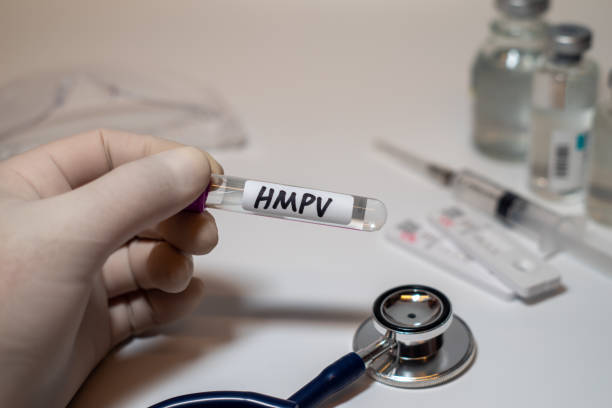Home
Robotic Knee Surgery
Blogs
Book Appointment
What is hMPV Virus? Symptoms, Causes, and Prevention Explained

Just as life started to feel normal again, there’s a new virus on the radar—hMPV, or the human metapneumovirus. While it’s not another COVID-19-level scare, it’s always better to stay informed before it sneaks up on us. This virus, known to cause respiratory infections, is already making its rounds, especially among kids, the elderly, and those with weaker immunity. And no, it’s not another surprise from China—scientists think it may have started with birds before finding its way to humans. Let’s dive in and stay one step ahead!
What is hMPV Virus?
Human Metapneumovirus (hMPV) is a virus that primarily affects the respiratory system. Discovered in 2001, it belongs to the same family as the respiratory syncytial virus (RSV). hMPV infections can range from mild cold-like symptoms to severe respiratory issues, particularly in children, older adults, and immunocompromised individuals. hMPV infections are seasonal, with most cases reported in late winter and early spring. It is one of the leading causes of respiratory illnesses globally, yet it often goes underdiagnosed due to its similarity to other respiratory conditions.
What Are The Common Symptoms Of hMPV Virus In Adults And Children?
The symptoms of hMPV virus can vary depending on the individual’s age and overall health. In many cases, the infection mimics other respiratory illnesses, making it difficult to identify without proper testing.
Symptoms of hMPV Virus in Adults
- Cough
- Nasal congestion
- Sore throat
- Fever or chills
- Shortness of breath
- Fatigue or body aches
Adults with pre-existing conditions or weakened immune systems may experience more severe symptoms, including pneumonia or bronchitis.
Symptoms of hMPV Virus in Children
- Wheezing or difficulty breathing
- High fever
- Persistent coughing
- Loss of appetite
- Irritability or lethargy
- Rapid breathing
Children, particularly infants, are more vulnerable to hMPV, as their immune systems are not fully developed.
How Does hMPV Spread?
The hMPV virus spreads in much the same way as other respiratory viruses:
- Person-to-person contact: Through respiratory droplets when an infected person coughs or sneezes.
- Surface transmission: By touching surfaces contaminated with the virus and then touching the face.
- Close proximity: Spending time in crowded spaces increases the risk of exposure.
The contagious nature of hMPV makes it important to take precautions, especially during peak seasons.
Diagnosis: How Is hMPV Detected?
Diagnosing hMPV often involves:
- Clinical Evaluation: A doctor examines your symptoms and medical history.
- Laboratory Testing: Nasal or throat swabs are collected and analyzed for viral RNA through methods like PCR testing.
- Chest X-rays: In severe cases, imaging may be used to detect complications like pneumonia.
Early diagnosis is key to managing symptoms and preventing the condition from worsening.
hMPV Treatment Options
Currently, there is no specific antiviral medication for hMPV. Treatment focuses on alleviating symptoms and supporting recovery. Options include:
- Over-the-counter medications: Pain relievers like acetaminophen or ibuprofen to reduce fever and discomfort.
- Hydration: Drinking plenty of fluids to stay hydrated.
- Rest: Giving your body time to recover.
- Oxygen therapy: For severe cases with difficulty breathing.
If symptoms worsen, especially in high-risk individuals, hospitalization may be required for monitoring and advanced care.
How Can You Prevent hMPV?
Prevention is crucial to reducing the spread of hMPV, especially during peak seasons. Here are some effective strategies:
1. Practice Good Hygiene
Regular handwashing with soap and water for at least 20 seconds can significantly reduce the risk of infection.
2. Avoid Close Contact
Limit physical contact, such as hugging or shaking hands, with infected individuals.
3. Disinfect Surfaces
Clean frequently-touched surfaces, such as doorknobs, phones, and countertops, using disinfectants.
4. Wear Masks
Wearing a mask in crowded or high-risk settings can help prevent the spread of respiratory droplets.
5. Isolate When Sick
If you’re experiencing symptoms, stay home and avoid social interactions to prevent infecting others.
Conclusion
The hMPV virus is a common but often overlooked cause of respiratory illnesses. While it typically results in mild symptoms, it can lead to severe complications in vulnerable populations. Understanding the symptoms of hMPV virus and adopting preventive measures can help curb its spread.
At Kapadia Multispeciality Hospital, we’re dedicated to raising awareness about health concerns like hMPV and empowering individuals to take charge of their well-being. If you or a loved one suspects an hMPV infection, consult a healthcare provider promptly for guidance.
MOST ASKED QUESTIONS ON hMPV Virus
Is hMPV virus contagious?
Yes, hMPV is highly contagious and spreads through respiratory droplets, close contact, or touching contaminated surfaces.
Who is most at risk of severe hMPV infections?
Infants, young children, older adults, and individuals with weakened immune systems are at higher risk.
Can hMPV virus cause long-term complications?
In rare cases, hMPV can lead to long-term respiratory issues like asthma or chronic bronchitis, especially in children.
How long does an hMPV infection last?
Most hMPV infections last 7-10 days, with more severe cases potentially taking longer to recover.
Are there vaccines for hMPV virus?
Currently, there is no approved vaccine for hMPV, but research is ongoing to develop one.
Can hMPV virus be mistaken for the flu or COVID-19?
Yes, hMPV symptoms can overlap with the flu or COVID-19, making diagnostic testing essential for accurate identification.
Does the hMPV virus only affect humans?
Yes, hMPV is specific to humans and does not infect animals.
How can I tell if my symptoms are from hMPV or another virus?
It’s best to consult a doctor for testing if you suspect an hMPV infection, as symptoms are often similar to other respiratory viruses.
